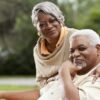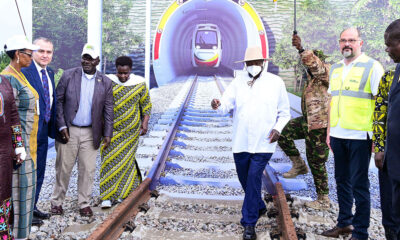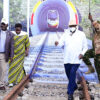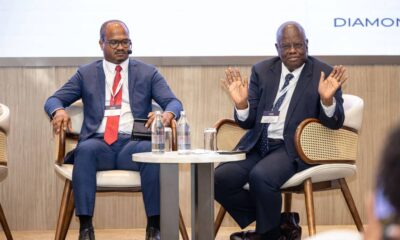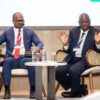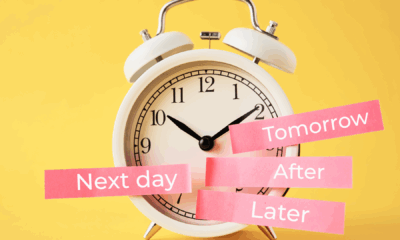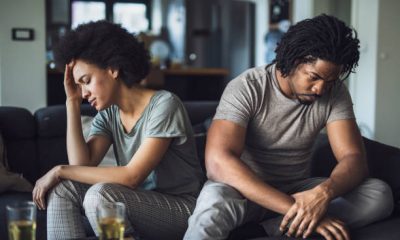Life & Style
Face to face with man on mission to popularise Uganda’s culture

UNCC’s new boss Francis Peter Ojede
We have met with artists, universities, embassies, ministry officials and many others.
Most of those we have met want to see services that we provide improve. They want to see a good auditorium. They want to see a good-looking National Theatre and Nommo gallery. They want to see back to back programmes. They also want to see visibility of the National Theatre and UNCC so that people outside there have more interest in the institution. They want to see diversity in the programmes for different categories of the population; the youth, children, universities.
They also want to see other aspects of culture, types of food, different languages that are being promoted, different cultural heritages being preserved and promoted. They also want to see UNCC being a unifier in terms of cultures so that those cultures can project us outside the country.
They want to see a well-managed UNCC. They want to see that resources obtained here are not misused.
Qn. Some artists have complained about turning the National Theatre into a parking lot and a place for wedding meetings. Is that the definition of misuse they point out?
As I pointed out before, they want the auditorium to be the core business. They want us to focus on the core business of the UNCC which is to Preserve, Promote and Popularise culture in Uganda and beyond. If you are able to do that, they will be happy. Then these other things you’re talking about like the restaurant, parking lot, will help you do that because you”ll be able to get some little resources. The important thing is, are those resources being used for the rightful purpose.
Qn. Using resources for the rightful purposes, demands openness and accountability. How will you account to your stakeholders?
I think the first thing we have done is to open up ourselves. We have a very open door policy. We’ve agreed that as a team, we will hear every person. We will listen to anybody, get their ideas and if we think they are useful, we adopt them. Again we have also decided that we reach out to all the stakeholders. We are talking about artists, parliamentarians, the media, the cultural institution, and the different international communities, embassies, the staff, the tenants, those involved in the crafts business.
Secondly, most of our decisions are taken as a team. When I get people from outside, I call some of my managers to my office, we sit here or in the boardroom and listen to their ideas and take decisions together.
We have also been reviewing our strategic plan which we are soon going to launch. And that strategic plan is telling us a lot of things we are going to do. It’s a 5year strategic plan.
Qn. Have you shared it?
We are still in the process of finalising it. But we have shared it across the UNCC top management. Once it is finished, it will be shared with the board, and once approved, it will be shared with everybody. This will guide our actions and will become a tool for evaluating ourselves. In that way people will know what we do. Some people mistake UNCC for National Theatre and yet National Theatre is just one project of UNCC.
Our strategic plan is built on partnership, public engagement and openness. We want to partner with as many people, institutions and groups as possible. We want to use different activities and communication channels like the media to reach out to everyone. And Uganda Broadcasting Corporation (UBC) has agreed to air programmes such as live debates on cultural issues every last Wednesday of the month.
Our next debate is going to be an interesting one. Do we have a national identity as a country?
While other people may find it easy to show their identity, Ugandans of different cultural backgrounds may have to consult each other to come up with an answer.
Qn. Perhaps different cultures signify diversity which is not bad.
Yes its diversity but I think there is a point where we need to have something that unites us. There should be unity in diversity so that when you talk about Uganda, there is a common aspect that unites everyone.
We should have a unifying culture without killing the various other cultures.
Qn. You pointed out that artists want a good auditorium. President Museveni too once lamented at the state of the auditorium. Are you thinking about giving it a facelift.
Our auditorium sits 377 people. In relative sense, it is small. The facilities in it were put up in 1959, meaning that a lot of the facilities have aged. But even with the oldness, it is still one of the best in the country. But we want to make it not only the best in the country but also best in the region. This means that we need to improve on a number of things like lighting. We still get the bulbs from Japan every time they blow.
The other big issue we want to work on is sound. We really need to work on it.
You must have noticed that our stage is good but it needs some work to improve it. The curtains system is still manual. Someone has to go behind to pull or push the curtains. We want to automate it. But all these are included in our strategic plan.
Finally, still about our auditorium, 377 people is still not enough. We want to be able to decentralise theatres so that every region has a theatre with a technical person who knows what to do. This would also help to promote different cultures in different regions. Because accessibility will be easy.
Qn. What is your plan for popularising culture across the country?
We want to start cultural competitions. Those cultural competitions will use the existing layers say from the village, to parish, to sub-county, district to the region and climax with a national competition. In the process, we shall identify talent, ensure that people support their own cultures and artists from where they come, the same way football is able to identify talent.
We also plan to open up cinemas using the 3D technology in our auditorium here. I hope that when we open up cinemas, we shall be playing and projecting the works and recordings of our artists.
We also plan to start live bands in an effort to nurture young talent. We will alternate between live bands and other events like exhibitions. Then in our parking, we shall organise cultural galas for the different regions.
Qn. NT has no library or a collection of productions, photos or paintings by Ugandans that clearly depict our culture through the times. Do you have plans of creating something like this and be able to promote cultural tourism?
That is a very important question. About two weeks ago, we got our production manager. I can tell you that compiling productions is one of the tasks I have tasked him with. With our very good studio, we shall be able to collect and produce different pieces.
Apart from shootings we do in the auditorium, we want our people in the studios to start going out with cameras and take pictures of different cultural events around the country. They will use those pictures to produce documentaries so that if a tourist comes to UNCC, we are able to give them a CD, map, or documentary from say Kabale, Fort portal, Karamoja or Lira, etc. We are not taking away the function of tourism, but we are complementing it purely from the point of view of culture. There has been some preservation but not to the scale that we would want. We also want to partner with other cultural institutions, so that they help us in identifying those unique cultural heritages that we need to preserve.
Qn. What are the views of artists regarding collecting their productions.
I can tell you that most of the artists are more than willing to share with us their productions. In fact at the forthcoming launch of the rebranding of UNCC, a number of them have expressed interest in taking part and performing.
So yes, it is in our interest that we reprint or redo, with their permission so that we start promoting them.
Qn. How do you plan to keep artists involved and updated with your activities?
We have opened up a very good public relations department headed by Mr. Robert Musiitwa. We are also using our website, the traditional media as well as meetings. We are meeting as many people as possible. We are going to have a meeting with all the artists together so that we introduce to them our plans. We think these meetings will be regular and not a one off so that we bridge the communication gap. We have also introduced the monthly public dialogue which will be held every last Wednesday of the month and hosted by UBC
Qn. You want to achieve many things. What are the top priorities you want to achieve in you first 100 days?
My 100 days plan includes fixing things very quickly. These include a strategic plan, and we are on course to achieving that. The second thing is; having a team to work with. We are almost there. When I came in, we didn’t have a contracts committee, a procurement officer, a finance or even production manager. We now have all these positions almost filled. We shall soon have our Gallery Manager.
We are also trying to ensure that our systems are automated. Our accounts, communications so that we move faster. And we are achieving this by ensuring that everyone has a computer which is networked.
The other thing we promised is to establish our asset base. Both in terms of assets and finances.
We are almost getting there because we have started valuing our assets using government valuers.
We also want to entrench ourselves in terms of partnerships so that we work together. We want Parliament, Artists, the media and development partners.
I also pledged to clean up our image. And we are doing this by talking to you people so that you write what you’re seeing, we also want to improve on our customer relations.
Qn. You’ve also embarked on a re-branding exercise. Why re-brand now?
People have had a long history of negative feelings about this place [NT]. A number of people moved away and others lost trust in whatever management was doing. But we’re coming out and saying give us a chance. As a new team we want to work with everybody to make the place better.
Comments




